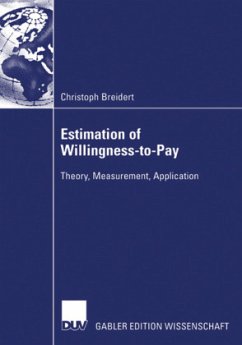
Estimation of Willingness-to-Pay
Theory, Measurement, Application

PAYBACK Punkte
0 °P sammeln!
The work of Christoph Breidert is positioned in a methodologically challenging area of marketing research that is highly relevant to both theoretical investigations and practical apphcations. Determination of willingness-to-pay for products and/or services from a customers per spective is crucial for modern approaches to pricing decision-making. Based on the in creasing availability of individual transaction data (e. g. , scanner data, consumer panel data, and data from Smart Cards) remarkable improvements have been achieved in es timating advanced price response models based on observed purch...
The work of Christoph Breidert is positioned in a methodologically challenging area of marketing research that is highly relevant to both theoretical investigations and practical apphcations. Determination of willingness-to-pay for products and/or services from a customers per spective is crucial for modern approaches to pricing decision-making. Based on the in creasing availability of individual transaction data (e. g. , scanner data, consumer panel data, and data from Smart Cards) remarkable improvements have been achieved in es timating advanced price response models based on observed purchase data. However, empirical price and/or product variations are typically very Umited in such historical data which complicates accurate willingness-to-pay estimation or makes it even imprac tical. This is especially true when entirely new products are planned to be introduced or alternative marketing strategies (e. g. , product bundhng) are considered by the manage ment. While asking customers directly for their wiUingness or unwillingness to purchase a specific product at the designated price commonly results in unreahstic estimates, ex perimental survey-based methods turned out to be a promising approach for the indirect measurement of willingness-to-pay. Among the most prominent techniques within this methodological framework is conjoint (or trade-off) analysis, which aims at inferring re spondents preference structures based on their reactions to systematically varied profiles of product attributes (mostly including price) in an experimental design. In his work, Christoph Breidert provides a systematic overview of the competing methods that have been and are still applied in todays practical and theoretical pricing research.














